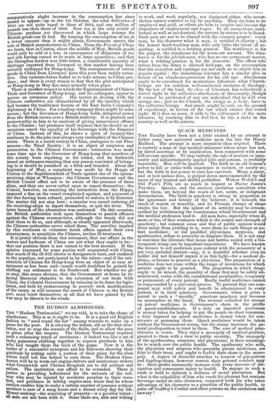THE HUDSON ALMSHOUSES.
THE "Hudson Testimonial," we are told, is to take the shape of almshouses. This is as it ought to be. It is a good old English fashion to "send round the heat" among winners to make up a purse for the poor. It is obeying the behest, old as the first reve- lation, not to reap the corners of the fields, and to allow the poor to glean after the reapers. The Hudson Testimonial required such a redeeming touch of sentiment : it looked too like a set of lucky gamesters clubbing together to express gratitude to him who had taught them the trick of the game. Now it is the leader of a successful enterprise and his followers showing their gratitude by setting aside a portion of their gains for the class whose hard toil has helped to earn them. The Hudson Alms- houses will be to worn-out engine-drivers and meritorious stokers what Greenwich and Chelsea Hospitals are to old soldiers and sailors. The institution can afford to be extended. There is justice in providing . beforehand for the servants of the rail- way who may be injured by accidents peculiar to their voca- tion, and prudence in letting engine-men know that he whose Caution enables him to make a certain number of journies without accident is sure of a snug house and a dinner every day for life. Money-makina—the acquiring of property—is a peculiar talent : CI men are not born with it. Some there are, able and willing to work, and work regularly, not dissipated either, who never- theless cannot contrive to lay by anything. They are born to be employed and paid, as others are born to acquire and become the dispensers of employment and wages. In all occupations, intel- lectual as well as mechanical, the servant by nature is to be found. Such men are not to be classed with the common pauper : every man, be his character what it may, is entitled to charity ; but the honest hard-working man, who only lacks the talent of ac- quiring, is entitled to a retiring pension. The workhouse is for the pauper, the almshouse for the worn-out servant. The alms- house is for the job-labourer, who has no one permanent master, what a retiring pension is for the domestic. The officer who retires from the Army is allowed half-pay, on the presumption that his avocation and earnings are not such as to enable him to acquire capital : the industrious labourer has a similar plea in favour of an almshouse-provision for his old age. Almshouses ought to be considered for meritorious labourers what Church- livings are for sedulous well-conducted students of theology. By the law of the land, the class of labourers has collectively a vested right in the collective almshouses of the country, though it cannot be predicated of any one individual that he will ever occupy one ; just as the Church, the clergy as a body, have to the collective livings. And much might be said, on the ground of expediency, in favour of the law which creates this vested right. If it does no more, it adds to the self-respect of the mere labourer, by teaching him to feel that he has a stake in the country as well as the parson.


























 Previous page
Previous page